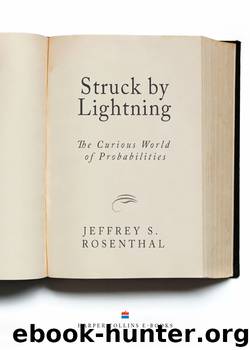Struck by Lightning by Jeffrey S. Rosenthal

Author:Jeffrey S. Rosenthal [Rosenthal, Jeffrey S.]
Language: eng
Format: epub
ISBN: 978-1-443-40167-8
Publisher: HarperCollins Canada
Published: 2005-03-17T05:00:00+00:00
10
Fifty-one Percent to Forty-nine Percent
The True Meaning of Polls
A number of national elections were held in 2004, including in Spain on March 14, in Canada on June 28, in Australia on October 9, and in the United States on November 2. The run-up to each of these elections featured large numbers of polls that attempted to gauge the opinions of the citizenry and predict the upcoming results. Most of those polls asserted various “margins of error” for their conclusions. For example:
● One month before the Spanish election, the Center for Sociological Research completed a huge survey of 24,000 Spanish voters. They predicted that the governing Popular Party would receive 42.2% of the vote, while the opposition Socialist Party would receive 35.5%. They asserted that their results had a margin of error of 0.64%.
● Two days before the Canadian election, EKOS Research Associates sampled 5,254 Canadian voters and predicted 32.6% support for the Liberals, 31.8% for the Conservatives, and 19.0% for the New Democratic Party (NDP), results they claimed “are considered accurate to within 1.4 percentage points, 19 times in 20.”
● Two weeks before the Australian election, an ACNielsen poll surveyed 1,397 voters and showed the governing coalition of Prime Minister John Howard leading the opposition Labor Party by 52% to 48%, with “a margin of error of plus or minus 2.6 percentage points.”
● Eleven days before the United States election, Reuters/Zogby surveyed 1,212 likely voters, giving George W. Bush a lead of 47% to 45% over John Kerry; they said that their margin of error was plus or minus 2.9 percentage points.
Similar claims are made all the time. What do they mean? Can polls really predict who will win an election? How closely do their results reflect the true opinions of the electorate? On what basis do they assert their accuracy or error levels? Are they really sure?
And why does it matter what the polls say, anyway?
Download
This site does not store any files on its server. We only index and link to content provided by other sites. Please contact the content providers to delete copyright contents if any and email us, we'll remove relevant links or contents immediately.
Modelling of Convective Heat and Mass Transfer in Rotating Flows by Igor V. Shevchuk(6433)
Weapons of Math Destruction by Cathy O'Neil(6267)
Factfulness: Ten Reasons We're Wrong About the World – and Why Things Are Better Than You Think by Hans Rosling(4737)
A Mind For Numbers: How to Excel at Math and Science (Even If You Flunked Algebra) by Barbara Oakley(3302)
Descartes' Error by Antonio Damasio(3271)
Factfulness_Ten Reasons We're Wrong About the World_and Why Things Are Better Than You Think by Hans Rosling(3235)
TCP IP by Todd Lammle(3180)
Fooled by Randomness: The Hidden Role of Chance in Life and in the Markets by Nassim Nicholas Taleb(3108)
The Tyranny of Metrics by Jerry Z. Muller(3067)
Applied Predictive Modeling by Max Kuhn & Kjell Johnson(3066)
The Book of Numbers by Peter Bentley(2964)
The Great Unknown by Marcus du Sautoy(2691)
Once Upon an Algorithm by Martin Erwig(2644)
Easy Algebra Step-by-Step by Sandra Luna McCune(2628)
Lady Luck by Kristen Ashley(2576)
Practical Guide To Principal Component Methods in R (Multivariate Analysis Book 2) by Alboukadel Kassambara(2541)
Police Exams Prep 2018-2019 by Kaplan Test Prep(2540)
All Things Reconsidered by Bill Thompson III(2389)
Linear Time-Invariant Systems, Behaviors and Modules by Ulrich Oberst & Martin Scheicher & Ingrid Scheicher(2364)
